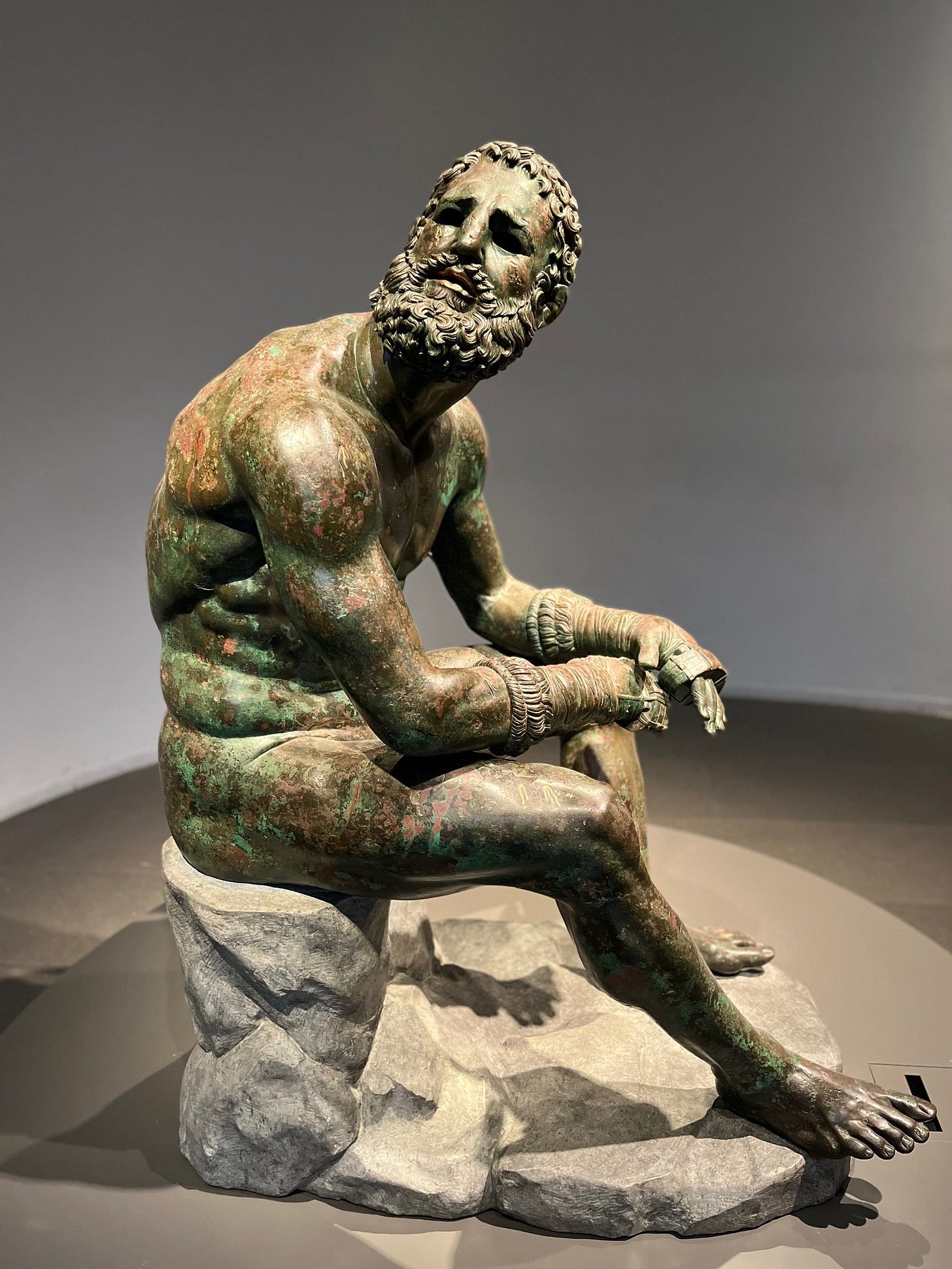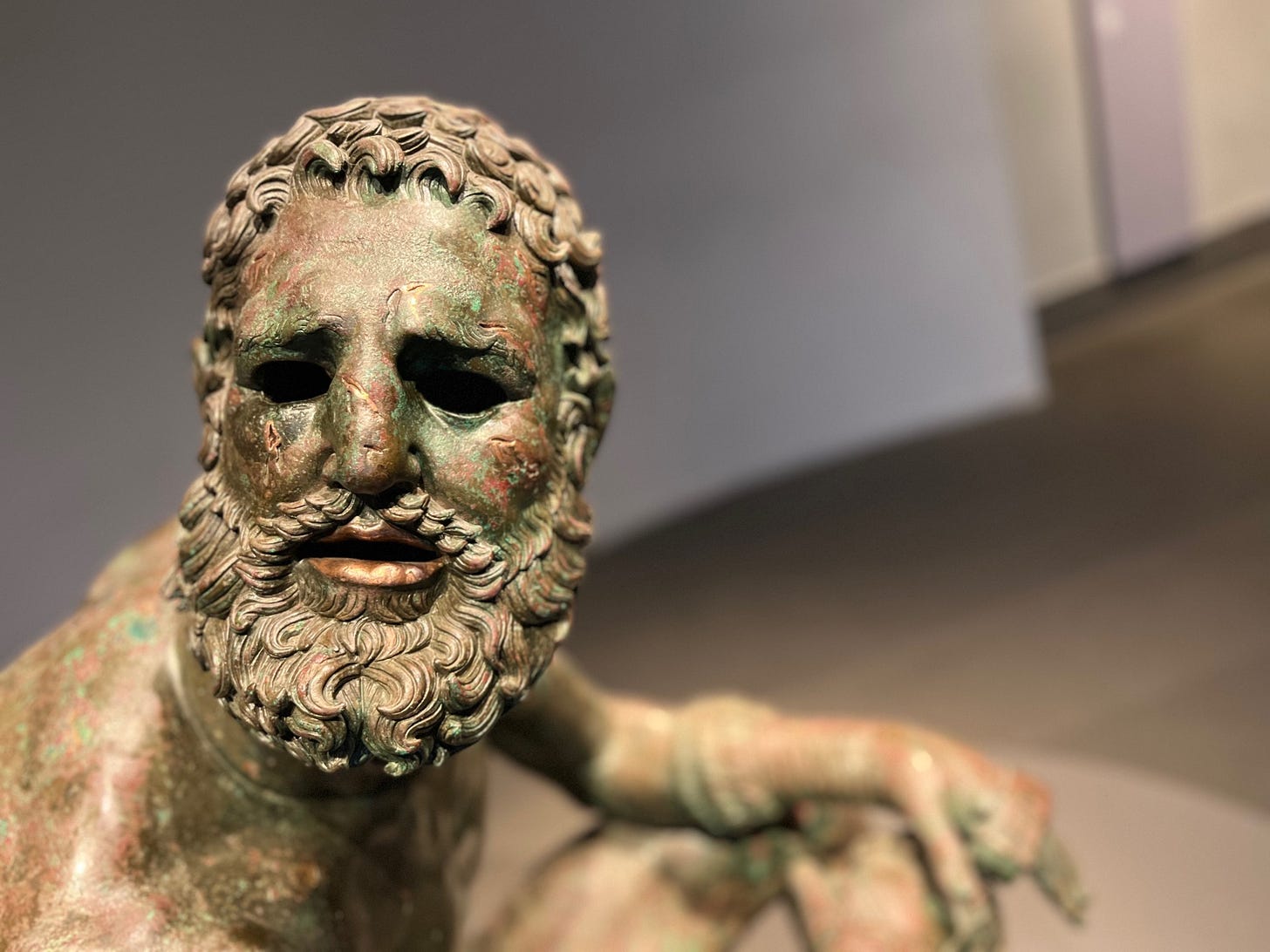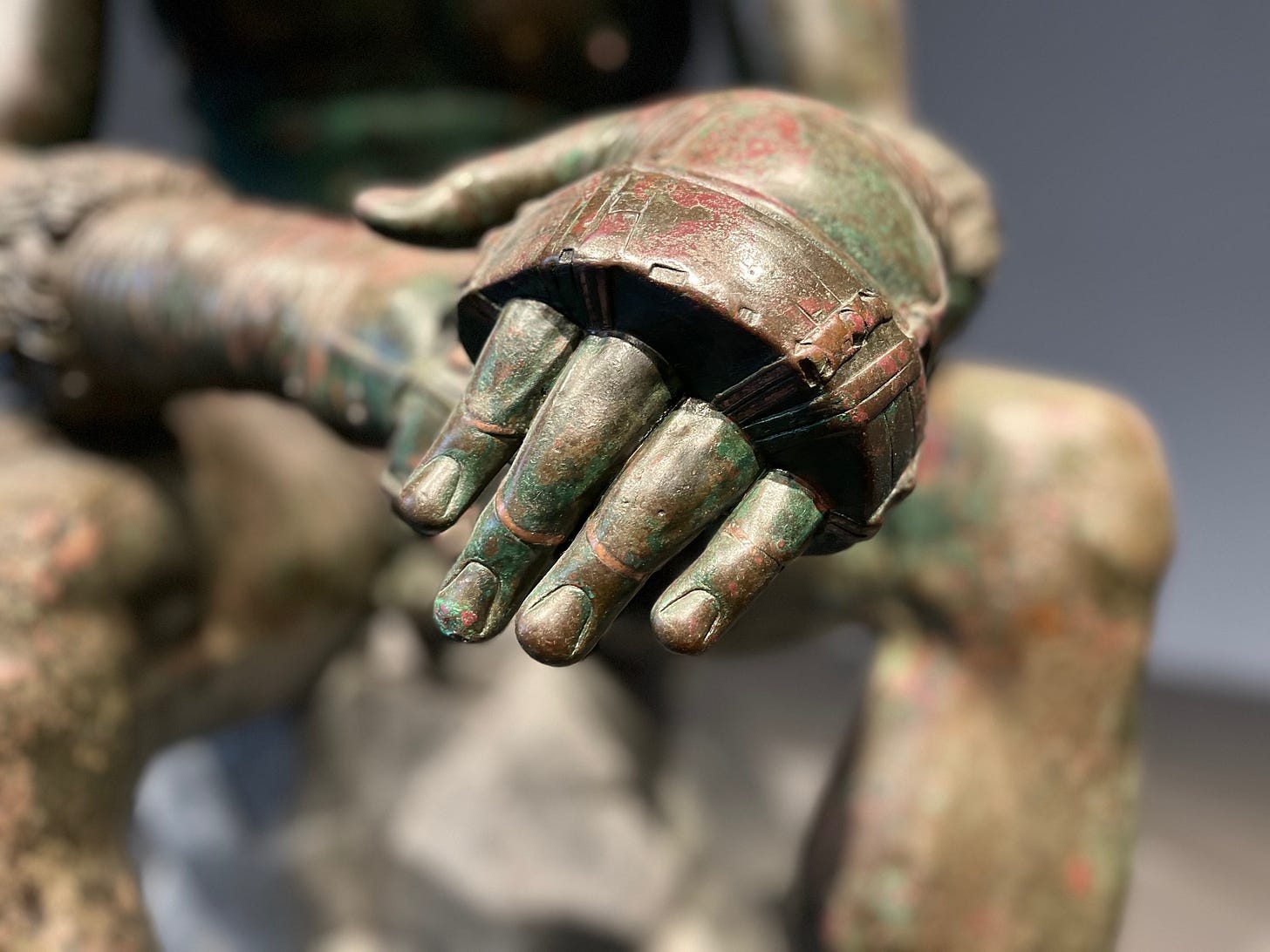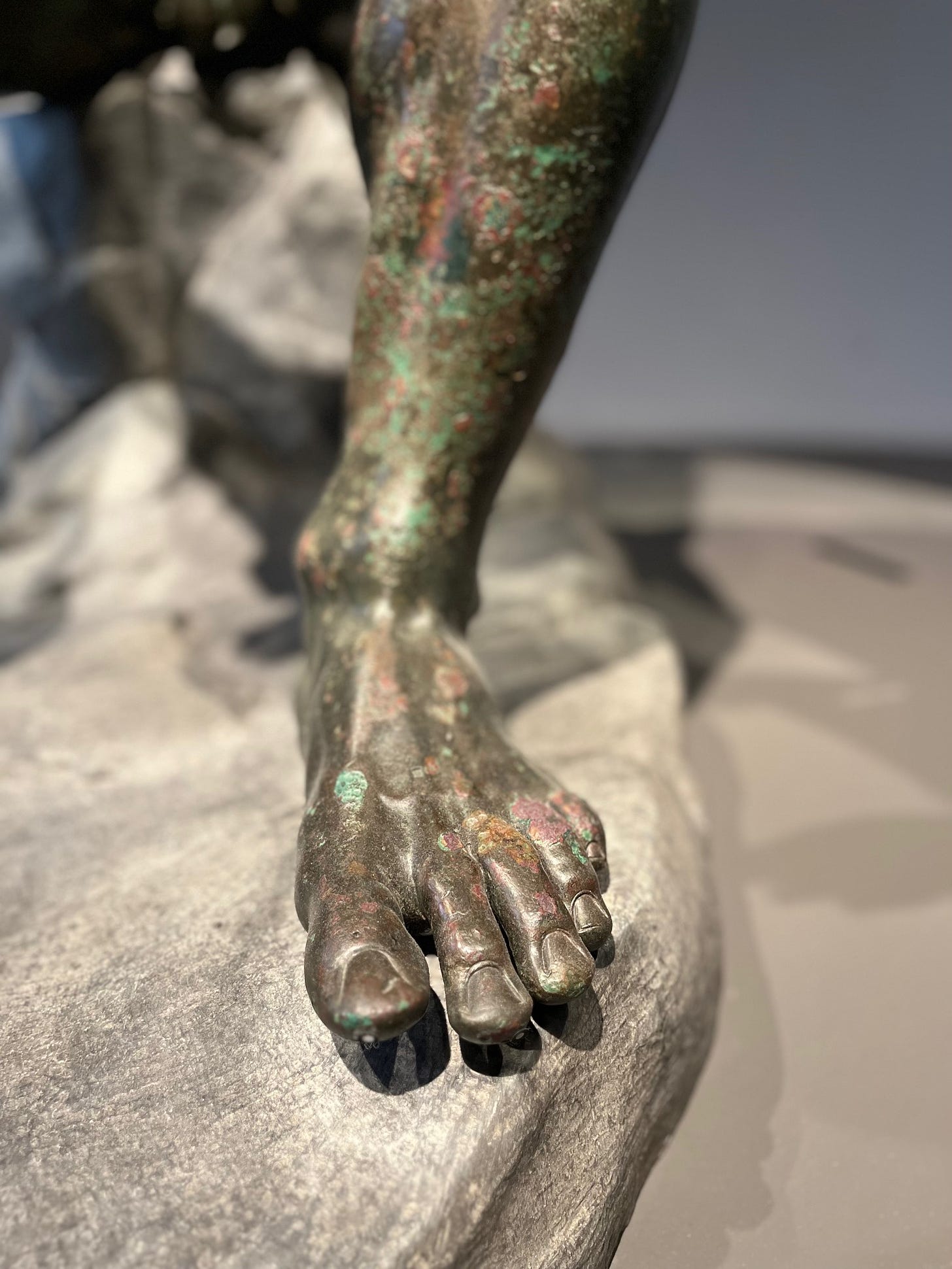
Dear Classical Wisdom Reader,
“Vado a chiamare la polizia!”
Now, sadly I don't know Italian... but I was able to understand the word Polizia well enough... and so, with hands up in the air, we tried to placate the man.
His neck veins bulging and clearly working on a heart attack, he continued to shout at me and my small family.
“We don’t speak Italian” I calmly replied, “we don’t know what you’re saying”.... He stormed off, threatening to call the Polizia again.
At this point, we weren’t certain if we should be truly alarmed or laughing. The situation was so absurd.
Literally a minute beforehand I was happily taking pictures at the Palazzo Massimo in Rome with my phone using what I endearingly call my ‘nimby gimby’, also known as gimbal or a small stabilizer. When the guard barked at us that no tripods were allowed, I immediately and respectfully started putting nimby gimby away, while attempting to assure him that it wasn’t a tripod.
Apparently though, I was not doing it fast enough (I was trying to turn it off) and the fellow, not understanding a word of English, decided that we were insulting him. Things started to escalate shockingly fast from there! The petit fonctionnaire fumed and yapped like a small dog, his beta status on full display.
We kept trying to calm him down and walk away because we had one room left to see - we had saved the best for last - and certainly didn’t want to leave without viewing the most prized work of the museum. But the situation was unfolding quickly... and bizarrely.
Finally, with his threats not landing due to lack of understanding, he returned with a senior who could translate.
“He wants you to know that it’s against the law to offend a public official,” the considerably more reasonable man slowly relaid, clearly humoring his ill humored colleague. With a side glance at the Dahl like villain beside him, and bored review of ourselves, the senior turned and left, followed by the man I can safely assume should be on blood pressure medication.
With this short yet confrontal episode behind us, we finally arrived at the Boxer. A rare complete Hellenistic bronze (unearthed only in 1885), he personifies fortitude, the aged athlete exhausted but alive. The details of the pain endured, the cuts and bleeding (highlighted in copper), convey the strength of mind to push oneself to the limit.
I couldn’t help but be impressed by the contrast of the minor official and this major sculpture. How did the former go so far out of his way to be ‘offended’? And to what end? The effort of just watching him implode was exhausting, I couldn’t imagine how that wasted energy felt...
Versus the latter, a solid statue that survived millennia, a perfect example of resilience.
To this end, I want to ask you dear reader, how can we be like the Boxer? Can we Choose not to be harmed? How can we train to be more resilient?
You can write to me directly at anya@classicalwisdom.com or reply to this email.
NB: this is the topic which we will be discussing at the next Plato’s Academy event, taking place THIS Saturday May 20th at Noon EST. With a fantastic lineup of philosophers, authors and psychologists, we will address the importance of Resilience and Philosophy in order to Not be Harmed.
You can secure your spot here.
I hope you can join us!
In the meantime, please enjoy today’s mailbag on the fall of Rome. What caused its decline? And did it really fall in the first place? Read on to discover your fellow classics enthusiasts' responses, below.
All the best,
Anya Leonard
Founder and Director
Classical Wisdom and Classical Wisdom Kids
P.S. Fun Fact! The gimbal was first described by the Greek inventor Philo of Byzantium (280–220 BC), who wrote of an eight-sided ink pot with an opening on each side, which can be turned so that while any face is on top, a pen can be dipped and inked — yet the ink never runs out through the holes of the other sides. This was done by the suspension of the inkwell at the center, which was mounted on a series of concentric metal rings so that it remained stationary no matter which way the pot is turned. The ancient Roman author Athenaeus Mechanicus, writing during the reign of Augustus (30 BC–14 AD), also described the military use of a gimbal-like mechanism, calling it "little ape" (pithêkion).
Monday Mailbag
On the Fall of Rome
Hi Anya,
Many people speak of the collapse of Rome as historically inevitable, as all civilisations supposedly must rise and fall (even though we may not be willing to accept that ours might). In the truest sense, I believe that Rome was allowed to fall by the same preventable means that contribute to the internal collapse of all civilisations - complacency. As soon as the better portion of people succumb to indifference regarding the fate of their civilization, that invites its fall by advertising their unwillingness to save it. When people are convinced something is not worth saving, whatever the reason, be it overconfidence in security or a cynicism regarding its historical virtues and benefits, that thing is on track to fall sooner or later. Being able to articulate and justify why a thing is worth preserving is the first and foremost means of preserving it.
Nick
-
Why did Rome Fall and Why Were the Vestas so Important?
I want to thank CW as well as Mary Naples for interweaving thoughts regarding Ancient Rome. These are such important topics for the sake of understanding history and who we are with regard to the tropes of history. Regarding the fall of Rome it might be the same question as to why did the United States fall and when did this happen? According to Gibbons, Rome fell as a result of Christianity and with the United States, one could say it is when we discovered the secrets of the TV show "The Brady Bunch."
From my point of view, Rome never fell but rather changed as did the United States, as well as England and other Empires. They have all lost their homogeneity and thoughts changed. Yes, Rome lost much of its literacy only to be eventually re-discovered later on in the later middle ages, but can we not say the same regarding literature of the US? For the US, I am yet waiting for the rediscovery. To say Rome fell is to ignore the people who inhabited the land for a long period of time.
We often ask the question of why Rome fell because we often only look at that which is powerful in a patriarchal way. If one looks at the architecture of Rome the Empire, the edifices signify power, and this was lost, that is until Brunelleschi re-discovered the secret of building domes, thus we have Il Duomo in Florence. With most civilizations, there has been a quest for power, and here is why the Vestas were so important, at least to my view. It was symbolic of controlling women's sexuality, that virginity is not the property of women but rather of men. To bring this to contemporary times, the biggest fear in the novel Dracula, is not Dracula himself but rather the release of women's sexuality. To kill Dracula is to kill not Dracula but rather (symbolically) the unleashing of female sexuality. And yes, the Vestal Virgins were to keep the fire lit, but maybe we all know what Freud said on this, I believe in his Totem and Taboo: that men had a homosexual desire to urinate out the fire, which is life-giving, whereas the female anatomy makes it hard to do so; thus, the women are in charge of the hearth.
Herman. H, San Francisco
Augustine told us. Because Rome lacked unifying ideals, instead attaching aspirations to divergent and passing needs and desires as represented in prayer to different Gods. As leadership no longer represented binding ideals, and without a God representing a unifying ideal, dissolution was inevitable.
Jeff w
-
Why did Rome fail? Of course, I have my two cents. Bad emperors, beaning one, another being the slave economy, for another, and in the third century, I have been told that 80% of the population of the Roman Empire were either serfs or slaves. I had better stop!
Mel H
-
Why did Rome fall? Did it commit suicide? Or was it murdered? Did it crumble from within or simply fall from the natural cycles of power?
The seed of plants and trees create the plants and trees that follow. Does that mean the earlier versions failed? No. The earlier generations are seeds for the ones that followed. For animals and man, the same principle applies. Parents become the seed for the next generation of both animals and man.
Man’s government, culture, and civilization function similarly. Since creation is cursed, entropy and death causes all creation to groan. This extends to what man creates, builds, and institutes.
Greece was the bulwark against Persia and the seed flowering from Rome against Islamic assault. This same seed also restrained and overcame Viking and Mongol invasions.
Greece was the seed of Rome and Rome the seed of what is now central and western Europe. Rome did not commit suicide. It simply became a good seed for what followed. This good seed sown in North America led to the first successful republic ever created. Sadly, the tree of that liberty is now dying from blight but the seed produced shall reappear yet again.
Entropy is not denied in a fallen world. Seed sowing, harvesting God has given His Word this shall never cease. Once harvested the plant creating the seed perishes but the seed from that perished plant waits only on opportunity for germination. And for that be more than thankful.
Charles F.
Unlock the Wisdom! Become a Classical Wisdom Subscriber and Enjoy ALL our resources! Including in-depth articles, magazines, podcasts and more:
Más info en frasco@menadelpsicologia.com / Tfno. & WA 607725547 Centro MENADEL (Frasco Martín) Psicología Clínica y Tradicional en Mijas Pueblo #Psicologia #MenadelPsicologia #Clinica #Tradicional #MijasPueblo
*No suscribimos necesariamente las opiniones o artículos aquí compartidos. No todo es lo que parece.




No hay comentarios:
Publicar un comentario